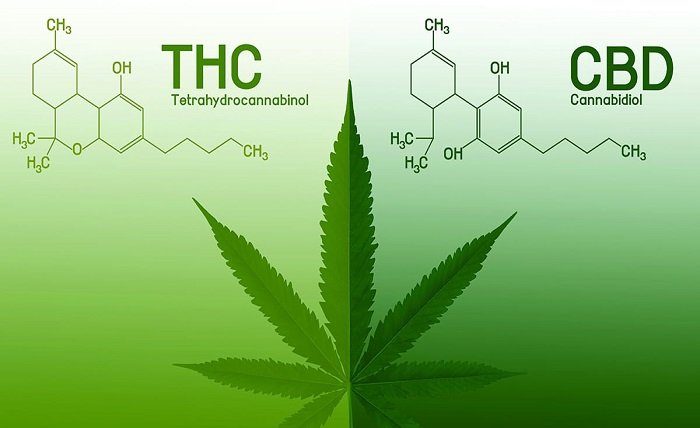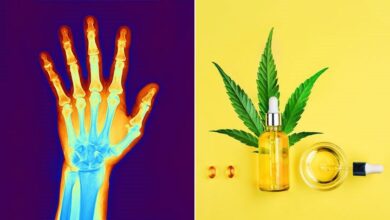Difference Between THC and CBD: Contrasting Aspects of Cannabis Compounds

In the world of cannabis, two prominent compounds have garnered significant attention for their diverse properties and potential benefits: THC (tetrahydrocannabinol) and CBD (cannabidiol). While both are derived from the cannabis plant, they possess distinct characteristics that set them apart. This article aims to delve into the dissimilarities between THC and CBD, shedding light on their effects, applications, and legal considerations.
Understanding THC and CBD
THC and CBD are phytocannabinoids, naturally occurring compounds found in cannabis plants. Phytocannabinoids interact with the endocannabinoid system in the human body, which plays a crucial role in maintaining homeostasis. Despite their similar chemical structures, THC and CBD exhibit contrasting effects on the body due to variations in their interactions with cannabinoid receptors.
Chemical Composition
THC and CBD share the same molecular formula, C21H30O2, but have different arrangements of atoms, leading to distinct properties. THC is a psychoactive compound primarily responsible for the “high” associated with marijuana use, whereas CBD is non-intoxicating and does not induce euphoria.
Psychoactive Effects
The psychoactive effects of THC are well-known, often leading to altered perceptions, relaxation, and euphoria. On the other hand, CBD does not produce a psychoactive high but may promote a sense of calm and relaxation. It is essential to note that THC and CBD can interact synergistically, modifying their effects when consumed together.
Medicinal Benefits
THC and CBD offer unique therapeutic potential. THC has been found to alleviate pain, reduce nausea and vomiting, stimulate appetite, and aid sleep. CBD, on the other hand, has shown promise in managing seizures, reducing inflammation, mitigating anxiety, and promoting overall well-being. Medical professionals are increasingly exploring the potential synergistic effects of THC and CBD for various conditions.
Legal Status
The legal status of THC and CBD varies across jurisdictions. THC is predominantly classified as a controlled substance due to its psychoactive nature, while CBD derived from hemp (with less than 0.3% THC) is legal in many regions. However, laws regarding CBD can be complex, and it is crucial to stay informed about local regulations.
Consumption Methods
THC and CBD can be consumed in various forms, including smoking, vaporization, oral ingestion, and topical application. Each method offers distinct advantages and considerations, such as onset time, duration of effects, and bioavailability. Choosing the appropriate consumption method depends on personal preferences and desired outcomes.
Side Effects
While generally well-tolerated, THC and CBD may cause side effects in some individuals. THC is associated with temporary memory impairment, increased heart rate, and anxiety in high doses. CBD, although considered safe, can cause drowsiness, dry mouth, and changes in appetite. It is advisable to start with lower doses and consult a healthcare professional when incorporating cannabis products into your wellness routine.
Drug Testing and Detection
Individuals subject to drug testing should be aware that THC can be detected in their system, potentially leading to legal or employment consequences. CBD isolate products without THC content are less likely to trigger positive drug test results. However, it is essential to choose reputable brands that adhere to strict quality control standards to ensure THC-free products.
Safety Considerations
While THC and CBD have a relatively low potential for abuse and addiction, responsible use is paramount. Individuals with a history of substance abuse, psychiatric disorders, or certain medical conditions should exercise caution when using cannabis products. Pregnant or nursing individuals are advised to refrain from cannabis use due to potential risks to fetal development.
Interactions with Other Medications
THC and CBD may interact with certain medications, affecting their efficacy or increasing the risk of adverse effects. It is crucial to consult with a healthcare professional before incorporating cannabis products if you are taking prescription medications.
Choosing the Right Product
When selecting THC or CBD products, factors such as potency, purity, and desired effects should be considered. Understanding product labels, third-party testing, and reputable sources is essential for ensuring product quality and safety. Consulting with knowledgeable dispensary staff or healthcare professionals can aid in making informed decisions.
Regulation and Quality Control
The cannabis industry is subject to evolving regulations and quality control measures. Government oversight, testing protocols, and certification programs contribute to ensuring product safety and efficacy. Staying informed about the regulatory landscape and supporting reputable brands can help navigate the ever-changing cannabis market.
Popular Misconceptions
There are several misconceptions surrounding THC and CBD. One common misconception is that CBD is entirely non-psychoactive. While CBD does not induce a high like THC, it can still have subtle effects on mood and cognition. It is important to understand the nuances and accurate information about these compounds to make informed choices.
Future Research and Developments
Ongoing research continues to uncover the potential benefits and applications of THC and CBD. Scientists are exploring their efficacy in treating various conditions, such as chronic pain, neurodegenerative disorders, and mental health conditions. Continued studies and clinical trials will provide further insights into the therapeutic potential of these compounds.
Conclusion
THC and CBD are distinct compounds derived from the cannabis plant, each offering unique properties and potential benefits. Understanding their differences empowers individuals to make informed decisions regarding cannabis use for wellness purposes. Whether seeking therapeutic effects or simply exploring the realm of cannabis, it is crucial to approach THC and CBD with knowledge, caution, and respect for their potential impact.




